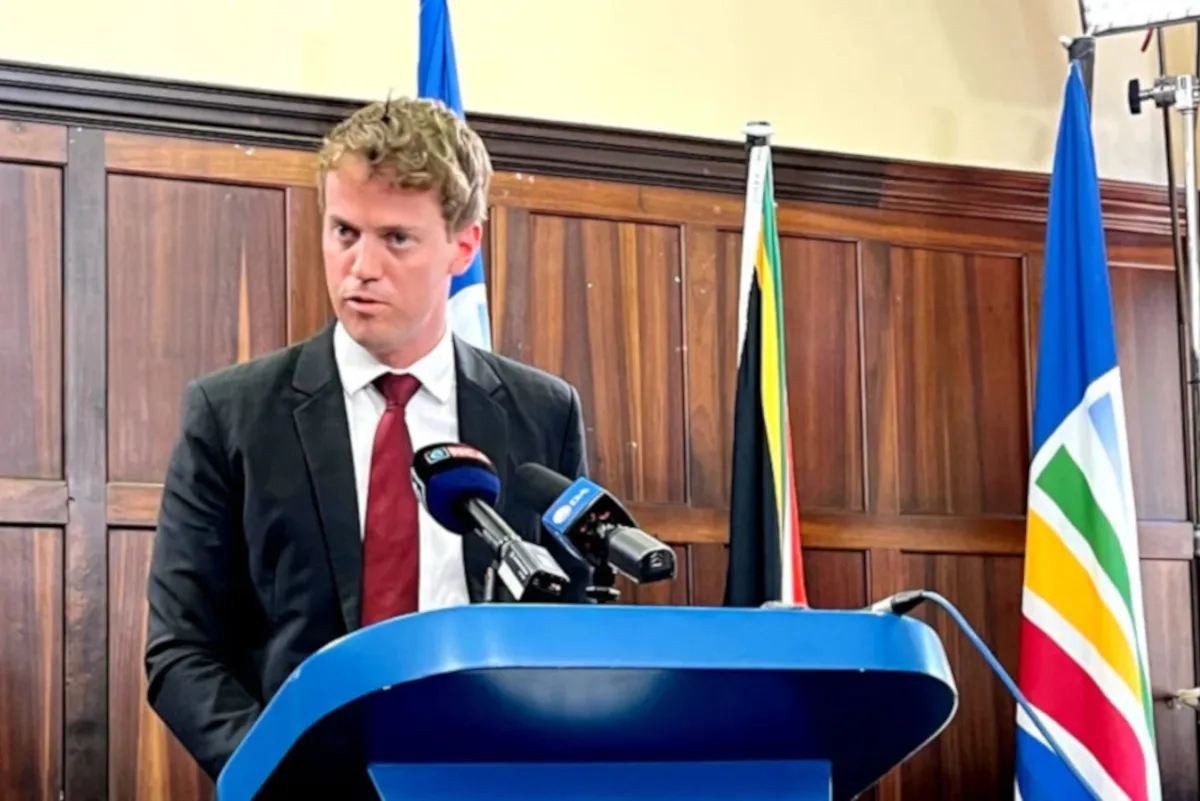
DA proposes an ‘alternative’ budget for South Africa without tax increases
The Democratic Alliance (DA) has presented its own budget proposal that it claims will find extra money to fund government spending.

The Democratic Alliance (DA) has unveiled its own budget proposal, claiming it can secure additional funds for government spending by reducing what it calls the state’s ‘reckless’ expenditure.
The party presented the proposal as the Government of National Unity (GNU) cabinet – which includes the DA – continues to debates changes to this year’s budget which was dramatically shelved at the last minute last week.
The decision was taken too postpone Finance Minister Enoch Godongwana’s Budget Speech on Wednesday, 19 February after tax proposals inside his budget caused unhappiness from parties within the GNU.
RELATED | Budget Speech postponement: Healthy democracy or cause for concern?
As reported by The South African website, the biggest sticking point regarded a proposed two-percentage point hike in VAT – from 15% to 17% – which would have raised an additional R68 billion to help fund government’s spending.
To soften the blow of the VAT hike, some ‘beneficial’ tax proposals were to be announced, such as increasing the zero-VAT basket of goods, keeping fuel taxes the same and adjusting income tax brackets.
Godongwana had wanted to use the money raised to plough it back into education and health – to keep doctors and teachers employed – as well as delivering above-inflation hikes to social grants and keeping the R370 SRD grant going for another year.
Reminder
After the ANC lost its majority in the 2024 national elections and the formation of the GNU, President Cyril Ramaphosa’s party needs the DA’s support in passing the budget.
The DA is the second-biggest party in the GNU and the ANC cannot form a majority without them.
The budget is now scheduled to be tabled on Wednesday, 12 March.
In response to the ‘original’ budget, the DA said that it would not support taxes being hiked.
The DA’s spokesperson on Finance, Dr Mark Burke, said during a briefing in Parliament on Tuesday that an alternative budget could be drawn up that does not include any tax hikes and can still cover the government’s promised spending.
DA’s full statement and budget proposal
Good afternoon, everyone.
My address to you is centred on six priorities, geared at getting our economy growing and delivering jobs. As Cabinet goes back to the drawing board on a new budget, we believe these proposals will position our country on the right footing – without raising taxes, growing our debt or cuts to frontline services.
Firstly, what I want to make clear is that the R60 billion in new expenditure that the Treasury said it needs to fund, is only 3% of the overall R1.9 trillion budget. There is no need to tax to find these funds, which can easily be sourced from failing, failed and underperforming programmes and sub-programmes. South Africa doesn’t have a revenue problem, it has a problem prioritising spending on programmes that drive growth and in turn job creation.
Our budgets keep getting bigger, our taxes keep rising, but our lives keep getting worse. In 1994, when Nelson Mandela introduced his first budget, it was three times smaller than today’s budget. The 2007 Mbeki budget, inflation-adjusted, was almost half the size of the 2025 budget.
Are South Africans twice as well off now? No. If GDP per person is anything to go by, life stopped improving for South Africans in 2011. After initially making great strides, we’ve stalled and then regressed. More than half of our people live in poverty. Those who can afford a house, see its value drop year after year in many parts of South Africa. Where we once boasted about how many villagers and townships we were connecting to the grid, now the discourse is about Eskom bailouts and load shedding.
Despite an ever-growing budget, lives are getting worse. The ANC solution is to spend more, borrow more, and tax more with zero focus on efficiency. It’s insane. We’re doing the same thing again and again but expecting different results. That’s not why we’re in the GNU government, we need to break the cycle and reject any new tax hikes that can only damage the economy.
So, while some media might be inclined to push the narrative of “how do to fill the void left by the rejected ANC VAT hikes”, we believe it’s time to think critically. We do not have a shortage of tax revenue, we have a shortage of scrutiny.
So our proposal is a simple six point plan:
No New Taxes – including VAT, personal income tax and company income tax:
South Africa’s tax base is too small to carry additional tax increases without choking private sector investment and further damaging the economy.
Tax increases, including a mooted wealth tax, will chase away investment, shrink our tax base, and ultimately, cause damage to the economy.
The government must find R60 billion in savings from wasteful spending, instead of burdening poor taxpayers further – for context, Government has a R1.9 trillion budget, R60 billion only constitutes roughly 3% of the overall budget.
Cut Unnecessary Government Expenditure
The DA proposes immediate cost-cutting measures that will free up at least R60 billion without cutting essential services:
– 50% reduction in government advertising budgets.
– 33% reduction in travel and catering expenditure across departments.
– Hiring freeze for all non-essential government positions for 12 months.
– A national audit of “ghost employees”, following the PRASA audit that uncovered approximately 10% of their workforce didn’t exist
Concrete, pro-business growth measures
Economic growth is the only sustainable path to prosperity. To drive investment and job creation, economic reforms that will instil confidence in markets should be prioritised:
– Fast-tracking logistics and trade reforms by setting clear deadlines for the concessioning of freight rail and major ports like Cape Town and Richards Bay.
– Establish a $5 billion (around R92 billion) concessional lending arrangement with the World Bank for high-impact urban infrastructure projects without adding to the national debt.
A Comprehensive Spending Review to Reprioritise R58 Billion
A three-month emergency spending review must be undertaken to identify wasteful and failing programmes. This will allow:
– Reallocation of funds to essential public services such as healthcare, policing, and education.
– The ability to fund legally mandated commitments, such as the R7 billion public sector wage increase, without tax hikes.
– The use of the Adjustment Budget Mechanism to shift spending as new revenue streams are unlocked.
The government can also use adjustment budgets throughout the year by reallocating funds as inefficiencies are identified – no tax hikes are needed.
Furthermore, conduct at least a nine-month deep dive to review outdated expenditure.
Increasing Revenue (without raising taxes)
Instead of suffocating taxpayers, South Africa should focus on impro wing tax compliance and unlocking state assets:
– Increasing tax compliance from 63% to 67% can generate R60 billion per year.
– Selling underutilised state-owned land and properties could raise R10 billion per year.
Protecting essential services and the most vulnerable
Unlike the ANC’s reckless approach, the DA’s plan ensures that critical services remain protected:
– No cuts to frontline healthcare workers, teachers, SAPS personnel, or social grants.
– The SRD grant should be converted into a Job Seekers’ Allowance, ensuring that it supports employment-seeking efforts.
We don’t need lip service, we need service delivery and reforms, and we need them actioned now so that we don’t sit here again next year with the same tired narrative, wondering how is it that South Africans are again worse off.
South Africa stands at a crossroads. We can either choose reckless tax hikes and unsustainable borrowing, or we can commit to real fiscal reform, economic growth, and efficient governance.
The DA’s plan is fiscally responsible, pro-growth and focuses on jobs. It is a plan that protects the poor while ensuring that the government lives within its means. It is a plan that proves that new taxes and reckless borrowing are not necessary – only political will is necessary.
We call on the GNU to adopt these measures and ensure that the 2025 Budget prioritises jobs, growth and fiscal stability, not the failed economic policies of the past.
